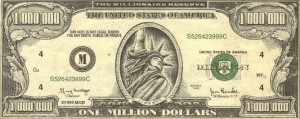 By Kevin F. McCormack, president of Pension Parameters Financial Services, Inc., based in Manhattan and Aberdeen, N.J.
By Kevin F. McCormack, president of Pension Parameters Financial Services, Inc., based in Manhattan and Aberdeen, N.J.
You may have seen Forbes Magazine’ announcement of its 2015 list of the world’s richest billionaires some time ago, but, be honest now, who could relate to them in any real way? One billion–that is, a thousand million—is almost an incomprehensible number. (And don’t even try to wrap your head around a trillion—and, no, there are no trillionaires). Think of it this way: a billion hours ago we were in prehistoric times. For sure, a billion is a bundle. But being a millionaire, well, that’s another story, and more within your grasp, at least by the time you hit retirement, than you may realize. There are, in fact, some 10 million millionaires in the U.S. and being a member of that august group begs two questions: 1. How do you accumulate a million by, say, age 65 and 2) In today’s world, is that necessarily enough in your kitty to provide for yourself in your golden years?
Getting There
How many ways are there to accumulate wealth? Sometimes it seems there are a zillion different retirement-plan options floated by financial advisers, books, seminars, columnists and the like, and, just in case you were wondering, there of course is no such real number as a zillion. We could talk (and I’m always happy to) about various plans, IRA roll-overs, employer contributions, dollar cost averaging and the theories of compound interest, diversifying your portfolio and rebalancing your account at least annually, but, for starters, one foolproof, simple-to-grasp trick to building a $1 million by retirement, when you get right down to it, is saving and then saving more. Start now—and do it consistently. If it helps, begin with small-ticket items each and every day. For instance: not buying that one $5 latte daily will save you between $1,500-$2000 a year, and it was Ben Franklin, whose face graces the $100 bill, who said, “beware of little expenses. A small leak will sink a great ship.”
Is a Million Enough?
Well, the question might be more answerable if it were 10, 20 or 30 years ago when having a million in the bank (or portfolio) could, thanks to such factors as low interest rates, high returns and more affordable health-care services, provide significant investment income and a more promising retirement. Back then a million meant wealth; now, nice to have for sure, but no guarantee of permanent financial peace of mind. As people live longer—and therefore spend more over the course of their senior years—the how-much-will-I-need query can, in some instances, be reduced to this: lifestyle, lifestyle, lifestyle. Put another way, it’s important to remember that having a greater life expectancy and more time on your hands can also mean a big uptick in recreational spending, and that, along with other big-cost items (particularly health care) needs to be a part of any sensible late-life blueprint. For some with lower retirement expenses (and expectations) a million may be enough and then some. But that’s not necessarily the case for all.
The dollar certainly isn’t what it used to be, but common sense and saving discipline have never lost their value and the bottom line in retirement planning remains unchanged: sock money away steadily and spend within your means. As Will Rogers observed, “too many people spend money they haven’t earned to buy things they don’t want to impress people they don’t like.” Don’t be one of those spenders, and, who knows, maybe there’s a million in your future.
